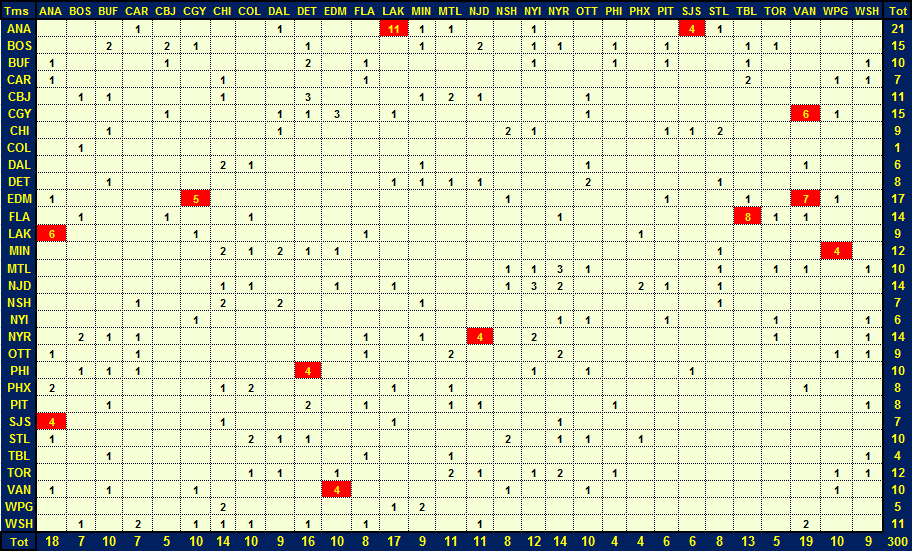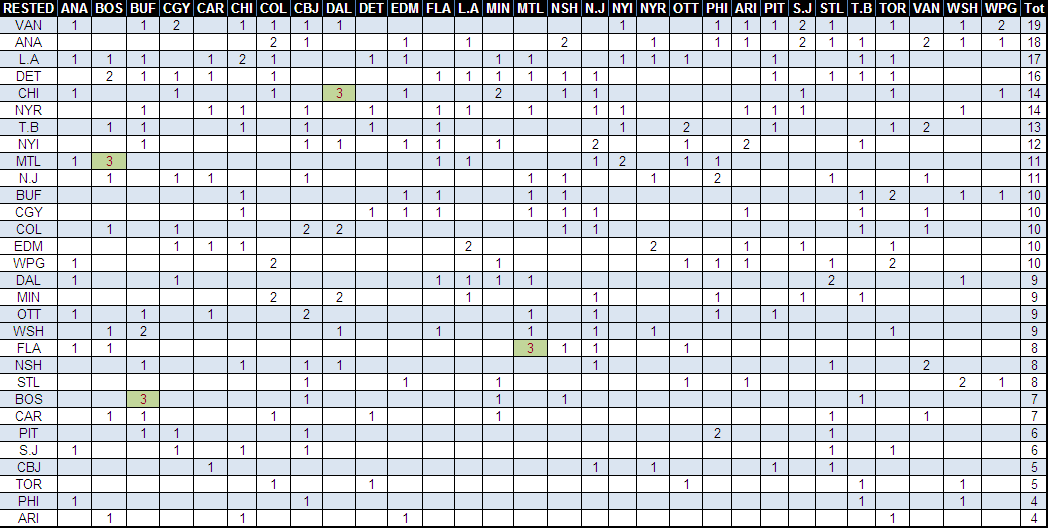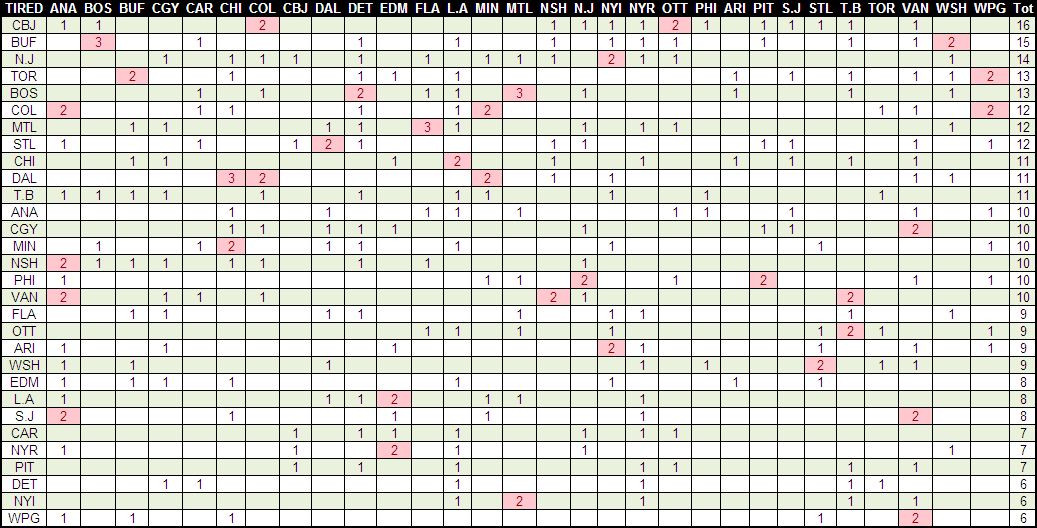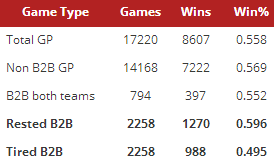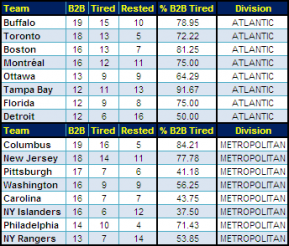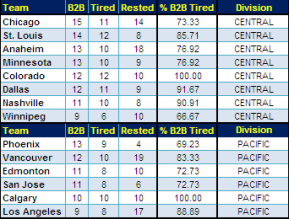As if the reigning Stanley Cup Champions weren’t already riding a heavy dose of skill as a competitive advantage, the NHL schedule makers decided to elevate their chances another level to their defending season, reasserting a past advantage, afforded to the Calgary Flames last season.
Last year, it was Alberta’s Dirty Little Secret; in 2014-15 it’s Californication for teams traveling through Southern California.
The LA Kings play 17 games as a rested team in 2014-15, featuring 13 games in the friendly confines of the StaplesCenter. In 11 of those games, the tired team had played Anaheim the day before. The direction is reversed in six contests traveling to Anaheim after a date with the Kings – with an additional four where teams landed in San Jose before traveling south. The breakdown is in the matrix here:
The team listed across the top has an advantage over the team in the first column. For instance, in addition to the Los Angeles to Anaheim example, Calgary plays five rested games versus a team that visited the Oilers the previous night.
In 2013-14, the Calgary Flames led the NHL with 20 rested games versus a team playing the back end of consecutive nights. The dirty little secret involved 13 games against the Edmonton Oilers in the first game, before making their way 304 kilometers south to Calgary.
Calgary’s 13 games bested the previous mark of 12 games, set by the LA Kings in 2008-09, with teams playing against Anaheim in the first game of back-to-backs.
Schedules tend to even out and Anaheim enjoyed this advantage over the Kings in 2006-07 and 2011-12, with 9 games featuring a team playing the Kings first before traveling the 45 kilometers to Anaheim.
2014-15 Rested and Tired
The extensive history tracked back to its origins can be found following this link into the rabbit hole for the extensive writing on this subject. I’ve usually set out basic definitions, so here’s the housekeeping related to rested and tired teams. Along with the graphic breakdown for each team and their opponents below, much more information is housed in this Google Doc, including an in-depth breakdown of teams individually and the season as a whole.
First comes the definitions of rested and tired teams.
-
Rested – team that has not played the previous night facing a team in the second night of a back-to-back set on consecutive nights.
Vancouver leads the NHL with 19 rested games, featuring 16 at home while according to the matrix above, teams have traveled through Edmonton (7) and Calgary (6) in 13 prior gam
-
Tired – a team playing its second game on consecutive nights versus a team that is rested and not played the previous night.
It’s no secret that the Blue Jackets have the most back-to back sets in 2014-15 with 19. This naturally means a high number of games as a tired team, 16, in fact, or 84% of their sets featuring Columbus as the tired team – this is expanded below.
The analytics paint a distinct picture here too. Historically, teams playing rested/tired perform at naturally predictable rates based on score effects measured by Corsi. The study is housed here, so I won’t get into the minutiae.
Rested Teams sport a winning percentage of about .596, while tired teams win a touch lower than half at 0.495, winning almost half the games played. In a season with only a few games, this isn't a major factor. But teams like the Blue Jackets (as illustrated below) can have a significant disadvantage with the new divisional playoff format.
Rested teams Corsi reflect the score effects with an average CF% of 51.8% slightly lower than 52% of Corsi close.
As a tired team the rates are even across the board (48.2%).
A team’s shooting percentage in game situation ‘close’ seemed to be a factor determining game outcomes. Tired teams enhance their chances at winning if they receive exceptional shooting accuracy early, and then weather the proverbial storm via score effects.
Rested teams don’t have to shoot the lights out to influence winning, shooting slightly less than 13% (12.88%) with an effect of a slower rate regarding score effects as a tired team doesn’t dominate the contest as much as a team that hadn’t played the previous night.
The sample size for these calculations consisted of over 2000 games played since the 2005-06 season.
Last Season
The Flames scorched a path in 2013-14 with a league leading 20 games as a rested team. Given the advantage (and that historically rested teams won almost 60% of their games), the Flames record of 8-10-2 is mildly disappointing until factoring in the rebuilding mode. Half of the wins needed extra time with three in a shootout.
The New Jersey Devils led the NHL with 16 games as a Tired team, sporting a record of 5-5-6, with four extra time losses via shootout, a sore point in a winless season for the Devils in the NHL’s latest gimmickry.
Two issues jump out from previous analysis and a new element I was tracking this season.
With teams generally losing 49.5% of their tired games, the league discrepancy has potential to steal teams ability to secure a playoff spot. If Columbus is playing 16 games as a tired team, and only winning half of the available 32 point, those 16 points left on the table could easily be the deciding factor between them and a playoff spot. The contrast is evident with divisional rival Detroit Red Wings leaving 12 available points as a tired team in six games, winning at a .495 clip offers a 10-point buffer to earning a playoff spot.
The New York Islanders offer the best ratio of back-to-back games to that as a tired team, skating in a league low 37.5% of their back-to-backs versus a rested team. Of the 16 sets, only six times do they face a rested opponent, while the league average is 73.45%.
Two teams, Calgary and Colorado play all their back-to-backs versus a rested opponent, as indicated in the table.
The East Coast bias continues strong, represented heavily within the Metropolitan Division where the average for the percentage of tired games in back-to-backs is a league low 58.24% and climbing to 72.77% within the Atlantic. Both Western Conference divisions average over 80%.
A playoff spot is likely on the line with a scheduling quirk playing a fairly significant role in each team's fate.
**********
Follow the McKeen's team on Twitter:
































